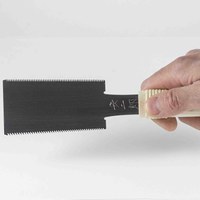Large Selection of High-Quality Japanese Saws in Our Online Shop: Dozuki, Ryoba, Kataba, and More
Welcome to our comprehensive news article on Japanese saws—a fascinating topic that appeals to violin makers, professionals in woodworking, and ambitious DIY enthusiasts alike. In our online shop, you’ll find a diverse range of top-notch tools, from Dozuki saws with a spine and Ryoba saws with double-sided teeth to Kataba saws without a spine for deeper cuts, fine Japanese saws for the most delicate woodwork, and microsaws or small Japanese saws for intricate projects. If you need a hardwood saw from Japan or a practical dovetail saw (flush cutting saw), we have you covered. We also offer a wide selection of Japanese replacement saw blades—ideal if you want to keep your tried-and-tested handles and simply replace the blade.
➜ Explore our wide range of Japanese saws here
From Dozuki to Kataba – A Wide Selection
- Dozuki Saw with Spine: Known for extremely precise, splinter-free cuts when making wood joints (e.g., dovetails). The solid spine enables exact trimming and finishing cuts in fine woods like maple, spruce, or wood used in violin making.
- Ryoba Saw with Double-Sided Teeth: A Ryoba has two different tooth patterns—one for rip cuts and one for cross cuts. Perfect for versatile woodworking projects when you want to cut along and across the grain without switching tools.
- Kataba Saw without Spine: The Kataba stands out for its greater cutting depth. With no reinforced spine, it can cut deeper into the wood, making it ideal for boards, beams, or panels, especially for large-scale cuts.
- Fine Japanese Saw: For fine cuts in hardwood or delicate joints, a fine Japanese saw excels thanks to its thin, sharp teeth that deliver extremely smooth cutting edges.
- Microsaws and Small Japanese Saws: Indispensable for very fine woodworking, model making, or restoration work (e.g., in violin making). Their minimal blade thickness and specialized tooth patterns enable maximum precision and control.
- Japanese Dovetail Saw (Flush Cutting Saw): Perfect for trimming protruding dowels or tenons flush with the work surface without damaging the surrounding wood. This flexible “flush cutting saw” ensures smooth, clean results.
Tip: If you plan to buy a Japanese saw, always look for the right tooth pattern (triangular vs. trapezoidal), blade thickness, and the specific saw type to get the best results. Especially for hardwoods, a tooth pattern tailored to that wood type pays off significantly.
High-Quality Brands and Masterful Craftsmanship
Alongside well-known manufacturers like Z-SAW (Zetsaw) and TAKAGI, our online shop also features genuine master forges such as SŌMASUTĀ 日本. These brands represent a centuries-old tradition of masterful Japanese forging:Japanese saw-making is built on artisan perfection and centuries of experience. Every saw is crafted with great care, often in small batches or even individually by experienced smiths, resulting in tools with exceptional sharpness, precision, and longevity.
- Z-SAW (Zetsaw): Since 1943, the company has stood for quality and innovation, known for Dozuki and Ryoba saws with high-quality, hardened blades.
- TAKAGI: Much appreciated for keyhole saws and grooving saws (“rip cuts for pegboxes”). Ideal for violin makers or model builders who need precise slots.
- SŌMASUTĀ 日本: A master forge specializing in ultra-fine microsaws (Ibaraki and Ibarame). Thanks to meticulous handcrafting and selected steel alloys, these saws have extremely sharp edges and long service life.
- Master Daizo Mitsukawa [光川大造]: The name of Master Daizo Mitsukawa represents fantastic craftsmanship in Japan. His professional saws are forged from high-carbon steel using traditional methods, making them resharpenable and ensuring long-lasting durability.
Which Tasks Suit Japanese Saws Best?
- Finest Wood Joints: Dozuki saws with a spine are perfect for dovetails, mortise-and-tenon joints, or precise trimming.
- Versatile Cuts: Ryoba saws are all-rounders—one side for rip cuts, the other for cross cuts.
- Large-Scale Cuts: Kataba saws without a spine allow deep cuts in thick boards and beams.
- Intricate Details: Microsaws or keyhole saws from TAKAGI handle tight openings in confined areas, ideal for restoration, model making, or violin building.
- Dovetail Saw: A flush cutting saw removes protruding dowels or tenons flush with the surface.
Why Buy Japanese Saws?
- Pull Stroke: Japanese saws cut on the pull, resulting in minimal tear-out, fine edges, and lower effort.
- Thin Blades: With thin, sharp blades, they achieve extremely precise cuts, ideal for complex joints or refined surfaces.
- Ergonomics & Control: The pull stroke provides greater control, excellent for detailed work.
- Versatility: From hardwood projects and model building to violin making and advanced furniture construction.
- Tradition & Quality: Brands like Z-SAW, TAKAGI, and SŌMASUTĀ 日本 stand for top-tier materials, fine craftsmanship, and long-lasting durability.
Replacement Saw Blades Also Available
Anyone who regularly works with Japanese saws appreciates the option of simply replacing the blade in case of wear or damage. Our selection includes various replacement blades in different lengths and tooth patterns, perfectly matching popular handle systems.
